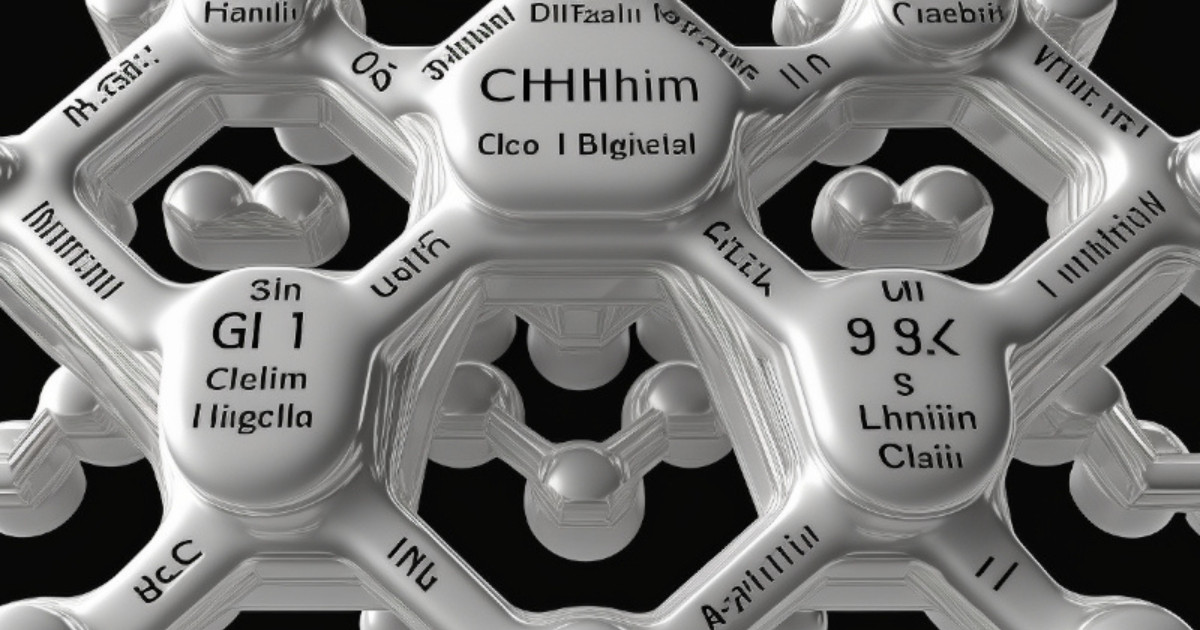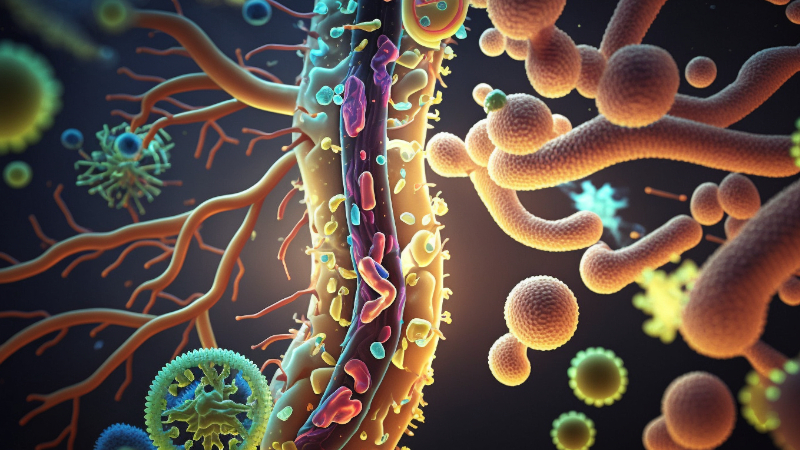If you’re a garlic lover, you’ve probably enjoyed the distinct taste and scent of this popular ingredient in many dishes. However, did you know that garlic contains a powerful compound called Allicin? Allicin for SIBO (Small Intestine Bacterial Overgrowth) is a topic of interest we are going to take a much closer look at today.
Allicin is a sulphur-containing compound that is produced when garlic is crushed or chopped. It is responsible for many of the health benefits associated with garlic. 1
Research has shown that Allicin has antimicrobial properties, which means it can help fight off harmful bacteria and viruses in your body. 2
Additionally, Allicin may help reduce inflammation and block free radicals, which can cause damage to your cells and tissues. This makes Allicin a potentially valuable addition to your diet and overall health, and Allicin for SIBO is a very interesting discussion.
Table of Contents
What is Allicin?
If you’re a fan of garlic, you’ve probably heard of allicin. This sulfur-containing compound is found in garlic and is responsible for its pungent smell and taste. Allicin is created when garlic is chopped, crushed, or chewed, and it’s this compound that gives garlic its many health benefits.
Allicin is a thioester of sulfenic acid and is also known as allyl-thiosulfinate. 3
Its biological activity can be attributed to both its antioxidant activity and its reaction with thiol-containing proteins.
Allicin is produced upon tissue damage from the non-proteinogenic amino acid alliin (S-allylcysteine sulfoxide) in a reaction that is catalyzed by the enzyme alliinase.
Allicin has been studied for its potential health benefits, including its ability to ease inflammation and block free radicals, unstable molecules that harm cells and tissues in your body. 4 5
Allicin for SIBO also offers anti-microbial and anti-bacterial effects, far surpassing the effectiveness of some antibiotics. However, more research is needed to fully understand the benefits of allicin.
What is SIBO?
Small Intestinal Bacterial Overgrowth (SIBO) is a digestive disorder characterized by excessive bacterial growth in the small intestine, which can lead to various uncomfortable symptoms.
Unlike the large intestine, the small intestine should have a relatively low number of bacteria. When the balance is disrupted, it may result in SIBO.
SIBO die off symptoms may occur as a result of treating the condition, as the dying bacteria release endotoxins and other substances that can cause temporary discomfort.
These symptoms may include bloating, gas, diarrhea, fatigue, and headaches. It is important to work closely with a healthcare professional to manage the treatment process and alleviate these symptoms effectively.
FODMAP intolerance is another gastrointestinal issue where individuals experience digestive discomfort due to the presence of specific carbohydrates called FODMAPs in their diet.

While FODMAP intolerance and SIBO are distinct conditions, they share common symptoms, and addressing one issue may help alleviate the other.
Allicin for SIBO is a promising natural treatment approach as Allicin, a compound found in garlic, exhibits potent antibiotic properties. Incorporating Allicin for SIBO treatment may help reduce bacterial overgrowth and restore balance in the small intestine.
Benefits of Allicin
The research into Allicin for SIBO has been shown to provide a variety of health benefits. However, SIBO is not all that allicin is considered to be beneficial for. Here are some of the other significant benefits:
Antibacterial Properties
Allicin has potent antibacterial properties that can help fight off harmful bacteria in your body.
It is effective against a wide range of bacteria, including E. coli, Staphylococcus aureus, and Salmonella.
These bacteria can cause serious infections, and allicin may be able to help prevent or treat them.
Antifungal Properties
Allicin also has antifungal properties, which means it can help fight off fungal infections. 6
This includes infections caused by Candida, a type of yeast that can cause thrush, vaginal yeast infections, and other types of fungal infections.
Allicin may be particularly effective when used in combination with other antifungal treatments.
Antiviral Properties
Allicin has been shown to have antiviral properties, which means it can help fight off viruses that can cause colds, flu, and other respiratory infections. It may also be effective against more serious viruses, such as HIV and hepatitis C. 7 8
While more research is needed to fully understand the antiviral properties of allicin, it shows promise as a potential treatment for viral infections. 9
Cardiovascular Benefits
Allicin has been shown to have several cardiovascular benefits. 10
It can help lower blood pressure, reduce cholesterol levels, and prevent blood clots. These benefits can help reduce your risk of heart disease, stroke, and other cardiovascular problems.
Cancer Prevention
There is some evidence to suggest that allicin, by way of its capacity to inhibit cell growth, and apoptosis-induced cell death, may help prevent cancer. 11
It has been shown to have antioxidant properties, which means it can help protect your cells from damage caused by free radicals. Free radicals can contribute to the development of cancer, so consuming allicin-rich foods like garlic may help reduce your risk of developing cancer.
As you can see, the potential benefits of Allicin for SIBO as a myopic focus are somewhat reductive. With more research comes more intriguing findings.

Allicin for SIBO
If you’re looking for sources of Allicin for SIBO, it doesn’t need to stop at garlic. Let’s take a closer look at some other natural sources where you can get your allicin fix.
Sources of Allicin
Coming from the Allium genus of plants, allicin is not only found in garlic, it also can be found in onions, leeks, chives, and shallots. These are all members of the Allium genus and are known for their pungent aroma and taste.
The following are some of the most common sources of allicin:
Garlic
Garlic is perhaps the most well-known source of allicin.
When garlic is chopped or crushed, it releases an enzyme called alliinase, which converts alliin (a sulfur-containing amino acid) into allicin.
This reaction is what gives garlic its characteristic flavour and aroma.
Onions
Onions are another common source of allicin. Like garlic, onions contain alliin and alliinase. 12
When onions are chopped or crushed, these compounds react to form allicin. This is a very easy way to get Allicin for SIBO into your routine. Onions are so common and versatile.
Leeks
Leeks are a member of the Allium genus and are closely related to onions and garlic. Like other members of this family, leeks contain alliin and alliinase, which can combine to form allicin. 13
If you haven’t used them before, leeks have a milder flavour than onions and are often used in soups and stews. As a source of Allicin for SIBO, these are much more subtle than onion if you find onion is too strong for your tastebuds.
Chives
Chives are a member of the Allium family and contain alliin and alliinase, which can produce allicin when the chives are chopped or crushed.
As a type of herb that is commonly used as a garnish or seasoning, chives are often added to salads, soups, and sauces. Being much smaller in consumption volume, they may be a less frequent and voluminous source of Allicin for SIBO.
Shallots
Shallots, like other members of the Allium family, shallots contain alliin and alliinase, which can produce allicin when the shallots are chopped or crushed. 14
Shallots are a type of onion that has a milder flavour than regular onions. They are a common ingredient in French and Southeast Asian cuisines. If you are using shallots as a source of Allicin for SIBO you might be shocked at how expensive they can be.
How to Maximize Allicin Absorption
So you want to get the most out of your garlic and amp up the Allicin for SIBO content? Check out these tips.
Crushing or Chopping Garlic
To maximize Allicin for SIBO absorption, it is recommended to crush or chop garlic and let it sit for about 10 minutes before cooking, or consuming it raw. This allows the alliinase to fully convert alliin to allicin.
Cooking Garlic
Cooking garlic can reduce the amount of allicin available for absorption. However, studies have shown that cooking garlic for a short period (less than 10 minutes) can increase the amount of allicin available. 15
This is because heat can activate other enzymes that help convert alliin to allicin. To maximize Allicin for SIBO absorption when cooking garlic, it is recommended to cook it for a short time over low heat.
Supplements
Garlic supplements are a convenient way to increase allicin intake.
However, not all garlic supplements are created equal. Look for supplements that contain alliin or alliinase, as these are the compounds responsible for allicin production.
It is also important to choose supplements that have been standardised to contain a certain amount of allicin. This ensures that you are getting a consistent amount of allicin with each dose.
It is important to note that allicin supplements should not be used as a replacement for fresh garlic in your diet. While supplements can provide a convenient source of allicin, fresh garlic contains a variety of other beneficial compounds that supplements may not provide.
Side Effects and Precautions
While allicin has many potential health benefits, it is important to be aware of its possible side effects and precautions. Here are some things to keep in mind.
Bad Breath and Body Odor
One of the most common side effects of allicin is bad breath and body odour.
This is because allicin is converted into other sulphur compounds that are released through the breath and skin.
If you are concerned about this side effect, you may want to consider taking an odourless garlic supplement instead to get your Allicin for SIBO levels.
Gastrointestinal Distress
Allicin can also cause gastrointestinal distress in some people, especially when taken in high doses.
This may include symptoms such as belching, gas, nausea, diarrhea, and heartburn.
If you experience any of these symptoms, you may want to reduce your dosage or stop taking allicin altogether.
Blood Thinners
If you are taking blood thinners or other medications that affect blood clotting, it is important to talk to your doctor before taking allicin supplements.
This is because allicin has blood-thinning properties that can increase the risk of bleeding if taken in high doses or combined with certain medications.
Pregnancy and Breastfeeding
There is limited research on the safety of allicin supplements during pregnancy and breastfeeding, so it is best to err on the side of caution and avoid them.
Garlic is generally considered safe to eat in moderation during pregnancy and breastfeeding, but it is always a good idea to talk to your doctor before making any changes to your diet or supplement regimen.
Allicin for SIBO Trivial Pursuit
Did you know that allicin was first isolated and studied in the laboratory by Chester J. Cavallito and John Hays Bailey in 1944? 16
Did you know that allicin has a chemical formula of C6H10OS2 and a molecular weight of 162.26 g/mol? 17
FAQs
Can Garlic Cure SIBO?
Garlic, as a part of your allicin for SIBO strategy, might show some potential in addressing the issue; however, it’s essential to note that it cannot cure SIBO on its own. Garlic and allicin may contribute to a multifaceted approach to SIBO treatment that includes dietary changes, probiotics, and in some cases, antibiotics or other antimicrobials.
While garlic has been found to exhibit antimicrobial activity against a variety of bacteria, including some that may be implicated in SIBO, the efficacy of garlic in treating SIBO has not been conclusively demonstrated in clinical studies.
Does Allicin Treat SIBO?
While allicin for SIBO might contribute to managing the condition, it is essential to understand that allicin is not a standalone treatment for SIBO.
Garlic’s antimicrobial properties are effective against various bacteria, including some strains that could contribute to SIBO. However, definitive evidence from clinical trials proving the efficacy of allicin in treating SIBO is lacking.
Furthermore, the optimal form, dosage, and duration of garlic supplementation or allicin for SIBO treatment are still uncertain.
Incorporating allicin for SIBO as part of a comprehensive treatment plan, which may include dietary modifications, probiotics, and, in some cases, antibiotics or other antimicrobial agents, may be beneficial.
What Naturally Kills SIBO?
There are several natural approaches to help manage SIBO (Small Intestinal Bacterial Overgrowth). While using allicin for SIBO has shown potential benefits, it is essential to consider other natural remedies as well.
Here are some natural strategies to discuss with your healthcare provider to help you address SIBO:
• Dietary modifications – Following a low-FODMAP (Fermentable Oligosaccharides, Disaccharides, Monosaccharides, and Polyols) diet can help reduce the symptoms of SIBO by limiting the growth of bacteria in the small intestine. Eliminating or reducing certain types of carbohydrates may improve gut health and help manage SIBO symptoms.
• Herbal antimicrobials: – Some herbs and spices have antimicrobial properties, which may help combat the bacterial overgrowth associated with SIBO. Examples include oregano oil, berberine, neem, and, as mentioned, allicin from garlic.
• Probiotics – Adding probiotics to your daily routine may improve gut health by restoring the balance of good bacteria in the small intestine. Some probiotic strains may also have antimicrobial effects that can help suppress the growth of harmful bacteria.
• Digestive enzymes – Supplementing with digestive enzymes can support the proper breakdown of food and absorption of nutrients, which may help alleviate some of the symptoms related to SIBO.
• Stress management – Chronic stress can negatively impact gut health. Developing stress management techniques such as meditation, yoga, or mindfulness can help improve overall well-being and support a healthy gut environment.
What are the Side Effects of Allicin for SIBO?
Using allicin for SIBO may offer potential benefits, but it is also essential to be aware of possible side effects. While allicin is a natural compound derived from garlic, it can still cause adverse reactions in some individuals. Some common side effects associated with the use of allicin for SIBO may include the list of side effects we considered earlier in this article.
It is important to remember that individual responses to allicin can vary, and not everyone will experience these side effects. However, it is always advisable to consult with a healthcare professional before starting any new supplement or treatment, including allicin for SIBO, to ensure its safety and efficacy for your specific needs.
How long does it take for Allicin to work?
The duration it takes for allicin to work can vary depending on individual factors and the specific health condition being targeted. In the context of using allicin for SIBO, the timeframe for noticeable improvements may also differ based on the severity of the condition, dosage, and individual response to the supplement.
Some individuals might experience improvements in their SIBO symptoms within a few days or weeks, while others may take longer to notice significant changes. It is generally recommended to follow a consistent regimen of allicin for at least 4-6 weeks to gauge its effectiveness. However, it is crucial to discuss with a healthcare professional the appropriate dosage and duration of treatment tailored to your specific needs.
Please note that allicin alone may not be sufficient to treat SIBO, and a comprehensive treatment plan, including dietary changes, probiotics, and other supplements or medications, might be necessary.
Can you take Allicin daily?
It is generally considered safe to take allicin daily, particularly when using allicin for SIBO or other health-related issues. However, the appropriate daily dosage of allicin may vary depending on individual factors such as age, weight, and overall health. It is crucial to follow the recommended dosage instructions provided by the supplement manufacturer or as directed by a healthcare professional.
Does Allicin Cause Liver Damage?
There is no conclusive evidence to suggest that allicin causes liver damage when taken in appropriate doses. Some studies have shown that allicin may even have liver-protective properties due to its antioxidant and anti-inflammatory effects.
However, it is important to note that these studies are preliminary and more research is needed to fully understand the impact of allicin on liver health.
While allicin for SIBO is generally considered safe when taken in proper dosages, it is essential to closely monitor your body’s response and report any adverse effects to your healthcare provider.
Conclusion
Garlic is a rich source of sulfur-containing compounds, particularly allicin, which has been studied extensively for its potential health benefits.
Allicin is responsible for many of the health benefits associated with garlic, including its antimicrobial, antioxidant, and anti-inflammatory properties. This is where allicin for SIBO is a light at the end of the tunnel for many.
Research suggests that allicin may help lower blood pressure, reduce cholesterol levels, and improve overall heart health. It may also have the potential as a natural antibiotic and be effective against a range of fungi as well as bacteria.

While more research is needed to fully understand the potential health benefits of allicin, incorporating garlic into your diet may be a simple and effective way to reap some of these benefits.
However, it is important to note that allicin is not present in garlic until it is crushed or chopped, and it is also quite quickly degraded by heat and acid. Therefore, to maximize the potential health benefits of allicin, it is best to consume garlic raw or lightly cooked.
Overall, allicin is a promising compound with potential health benefits, and further research is needed to fully understand its effects. However, incorporating garlic into your diet may be a simple and effective way to support your overall health and well-being.
What are your thoughts on the allicin for SIBO discussion? Join the conversation on Instagram and Pinterest.
References
- “Garlic and Organosulfur Compounds” – Oregon State University Staff, 28 April 2014 [Oregon State University] [Archive] ↩︎
- “Antibacterial Properties of Organosulfur Compounds of Garlic (Allium sativum)” – S. B. Bhatwalkar, R. Mondal, S. B. N. Krishna, J. K. Adam, P. Govender, R. Anupam, 27 July 2021 [PubMed] [Archive] ↩︎
- “Mechanism and kinetics of synthesis of allicin” – V. Nikolic, M. Stankovic, Lj. Nikolic, D. Cvetkovic, 30 April 2003 [Pharmazie] [Archive] ↩︎
- “Allicin, an Antioxidant and Neuroprotective Agent, Ameliorates Cognitive Impairment” – M. S. Nadeem, I. Kazmi, I. Ullah, K. Muhammad, F. Anwar, 11 January 2022 [PubMed] [Archive] ↩︎
- “Cellular Mechanisms Underlying the Cardioprotective Role of Allicin on Cardiovascular Diseases” – J. L. Sánchez-Gloria, A. S. Arellano-Buendía, J. G. Juárez-Rojas, F. E. García-Arroyo, R. Argüello-García, F. S. Sánchez-Muñoz, L. G. Sánchez-Lozada, H. Osorio-Alonso, 15 July 2022 [MDPI] [Archive] ↩︎
- “Quantitative and Qualitative Analysis of the Antifungal Activity of Allicin Alone and in Combination with Antifungal Drugs” – Y. S. Kim, K. S. Kim, I. Han, M. H. Kim, M. H. Jung, and H. K. Park, 5 June 2012 [PubMed] [Archive] ↩︎
- “Antiviral Potential of Selected Medicinal Herbs and Their Isolated Natural Products” – W. P. R. T. Perera, J. A. Liyanage, K. G. C. Dissanayake, H. Gunathilaka, W. M. T. D. N. Weerakoon, D. N. Wanigasekara, W. S. K. Fernando, R. M. H. Rajapaksha, R. P. Liyanage, B. T. Perera, 8 December 2021 [PubMed] [Archive] ↩︎
- “Antiviral potential of garlic (Allium sativum) and its organosulfur compounds: A systematic update of pre-clinical and clinical data” – R. Rouf, S. J. Uddin, D. K. Sarker, M. T. Islam, E. S. Ali, J. A. Shilpi, L. Nahar, E. Tiralongo, S. D. Sarker, October 2020 [ScienceDirect] [Archive] ↩︎
- “Evaluate the Therapeutic Effect of Allicin (L-cysteine) on Clinical Presentation and Prognosis in Patients with C-19” – H. Yaghoubian, H. Niktale, A. P. Yazdi, V. Ghorani, M. M. Rashed, A. M. Hashemian, 18 June 2021 [PubMed] [Archive] ↩︎
- “Cellular Mechanisms Underlying the Cardioprotective Role of Allicin on Cardiovascular Diseases” – J. L. Sánchez-Gloria, A. S. Arellano-Buendía, J. G. Juárez-Rojas, F. E. García-Arroyo, R. Argüello-García, F. S. Sánchez-Muñoz, L. G. Sánchez-Lozada, H. Osorio-Alonso, Date [PubMed] [Archive] ↩︎
- “Allicin and Digestive System Cancers: From Chemical Structure to Its Therapeutic Opportunities” – M. Sarvizadeh, O. Hasanpour, Z. Naderi Ghale-Noie, S. Mollazadeh, M. Rezaei, H. Pourghadamyari, M. M. Khooy, M. Aschner, H. Khan, N. Rezaei, L. Shojaie, H. Mirzaei, 27 April 2021 [PubMed] [Archive] ↩︎
- “Onion (Allium cepa) and its Main Constituents as Antidotes or Protective Agents against Natural or Chemical Toxicities: A Comprehensive Review” – M. Dorrigiv, A. Zareiyan, H. Hosseinzadeh, Winter 2021 [PubMed] [Archive] ↩︎
- “Allicin: Chemistry and Biological Properties” – J. Borlinghaus, F. Albrecht, M. C. H. Gruhlke, I. D. Nwachukwu, A. J. Slusarenko, 19 August 2014 [PubMed] [Archive] ↩︎
- “Therapeutic Uses and Pharmacological Properties of Garlic, Shallot, and Their Biologically Active Compounds” – P. Mikaili, S. Maadirad, M. Moloudizargari, S. Aghajanshakeri, S. Sarahroodi, October 2013 [PubMed] [Archive] ↩︎
- “The 10 Minute Garlic Rule” – S. Chadwick, 1 July 2015 [Brainstorm Health] [Archive] ↩︎
- “Allicin, the Antibacterial Principle of Allium sativum. II. Determination of the Chemical Structure” – C. J. Cavallito, J. H. Bailey, 1950 [ACS] [Archive] ↩︎
- “Allicin” – PubChem Staff, 26 March 2005 [PubChem] [Archive] ↩︎
Last Updated on 5 months by D&C Editorial Team


